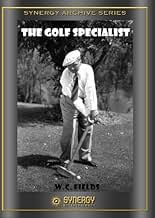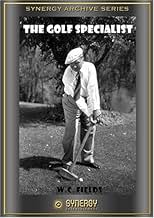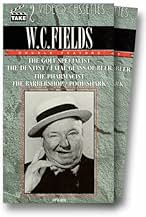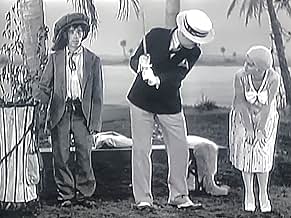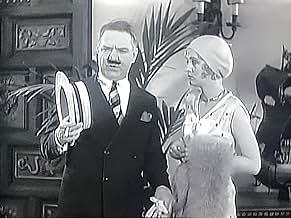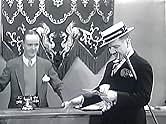NOTE IMDb
6,2/10
1,3 k
MA NOTE
Ajouter une intrigue dans votre langueJ. Effingham Bellweather plays golf despite many slapstick setbacks.J. Effingham Bellweather plays golf despite many slapstick setbacks.J. Effingham Bellweather plays golf despite many slapstick setbacks.
- Réalisation
- Scénario
- Casting principal
Allan Bennett
- Guest in Lobby
- (non crédité)
William Black
- Guest in Lobby with Letter
- (non crédité)
Naomi Casey
- Little Girl
- (non crédité)
John Dunsmuir
- Deep Sea McGurk - House Detective
- (non crédité)
Shirley Grey
- House Detective's Wife
- (non crédité)
Jack Irvin
- Deep Sea McGurk
- (non crédité)
Johnny Kane
- Walter - The Desk Clerk
- (non crédité)
Harriet E. MacGibbon
- Lady Walking Dog
- (non crédité)
Allen Wood
- The Caddy
- (non crédité)
Avis à la une
This is an early Fields treasure. While it lacked any sort of finish, it has moments that are very funny. We are first introduced to an attractive but lunkheaded woman who goes after every man she sees. She ends up on the links with Fields and we get a series of funny moments. But what has always cracked me up is the guy who plays the caddy, with his giant hat and his total cluelessness. What we have here is one pratfall after another. We must ask, "Will he ever hit the ball?"
W.C. Fields is great as he tries to teach the game of golf to the flirtatious wife of a hotel detective. His caddy during the lesson is nearly as funny as W. C., wearing a hat bigger than he is; this hat figures in most of the comedy bits in this short and becomes a character on its own. The lazy caddy stands inert for the majority of the film, but still manages to take the spotlight away from W.C. at odd moments.
W.C. Fields brightened up anything he was a part of. this twenty minute shortie is like a vaudeville bit. The house detective's wife flirts with the paying guests, and then waits for hubby to come along and chase him off. One of the hotel guests is J. Effington Bellweather (Fields). even his name is a naughty joke. wearing his typical straw hat, he apparently owes someone a ton of money, and tries to stay one step ahead. the women and girls in this bit all screech and scream... yeegods. then Fields goes into his physical comedy... slapstick humor with things sticking to shoes, shoes that squeak, and accidentally hitting things with a club. Gotta say, this is one of the more annoying bits by Fields... i usually LOVE his antics, but with the yelling, screaming, and un-inspired bits, can't rate this one as high as I usually do for Fields. Although the list of crimes he has committed is pretty funny, as the camera pans down the list. the opening music and picture are pretty messed up, since the tape is so old, but it clears up after a few minutes. this one is just SO-SO. Extra interesting as a bit of W.C. Fields' history, but some of the slapstick humor is a pretty dated at this point in time.
Even though the subject matter of two of W. C. Fields' short are the same, the results are quite a bit different. Despite the titles, both THE GOLF SPECIALIST and THE DENTIST involve golfing hi-jinx, though THE GOLF SPECIALIST is all obviously filmed in a sound stage instead of outdoors and it tended to have far fewer laughs--instead relying on Fields muttering to himself much of the time or watching the annoying antics of the world's stupidest caddy. It seems pretty obvious that this short is based on one of Fields' Vaudeville routines in the way it's constructed PLUS Fields is wearing the bushy black mustache he often wore on stage. Not particularly great, but an interesting historical curio, as it is Fields' first sound film.
From the very first moments of The Golf Specialist, W. C. Fields' talkie debut, it's apparent that we're watching a technically primitive effort that can't hold a candle to The Great Man's best comedies. It's comparable to the Marx Brothers' first film The Cocoanuts in a number of ways, from the stilted pacing and uncertain camera work right down to the obviously bogus "Florida" location that looks suspiciously like it was staged in a cramped and stuffy East Coast studio. But, as with the Marxes' debut, there are stretches when the comedy transcends the antiquated technique and you find yourself laughing anyhow. This film features a prolonged opening sequence in a hotel lobby (again reminiscent of The Cocoanuts) that lurches from bit to bit without ever finding a consistent comic rhythm, although there are some amusing moments. Some of the actors-- especially the old guy playing the sailor --are downright amateurish, and when Fields finally makes his entrance it comes as a relief. He's still wearing that icky little mustache he wore in his silent comedies, but it's good to see him anyway. Almost immediately he's confronted by a little girl with an annoyingly shrill voice, and their run-in serves as a dress rehearsal of sorts for Fields' many battles with obnoxious children yet to come.
Again like The Cocoanuts this film, despite its technical limitations, stands as a valuable record of a popular stage act of the Jazz Age, for the second half preserves Fields' famous golf routine. Variously known as "A Game of Golf" and "An Episode on the Links," the act was introduced in the Ziegfeld Follies of 1918 and is a set-piece of gradually mounting frustration. The act features Fields on the golf links simply trying to cue up and hit a ball while his lady friend watches. He is thwarted at every turn by distracting sounds, a misplaced pie, errant wrapping paper that somehow winds up in his mouth, the misbehavior of his golf clubs, and most of all by the bizarre little man who serves as his caddy. Fields used a portion of the act in his silent feature So's Your Old Man but it lost some of its punch in the silent medium, what with so much of the comedy depending on sudden noises. Here at least we get to hear the appropriate sound effects and savor Fields' quips and murmured ramblings, although personally I find his over-reliance on the phrase "Stand clear and keep your eye on the ball!" wearisome after awhile. But unsung leading lady Shirley Grey provides a boost with a number of amusingly delivered Dumb Dora remarks, while a comic named Al Woods is a hoot as Fields' oddball caddy.
Actress Louise Brooks was a dancer in the Follies in the mid-1920s when Fields revived his golf act and she used to watch him from the wings on a nightly basis. Brooks later said that the routine was never as funny in the movies as it was on stage. That surely must be so, but we can only imagine how much funnier it was when Fields was working off the response of a live audience. In any case, having this record of the act is better than nothing, and in the meantime viewers who find The Golf Specialist disappointing will want to take a look at Fields' underrated 1934 feature You're Telling Me!, which offers a more satisfying version of the golf routine than the one found here.
Again like The Cocoanuts this film, despite its technical limitations, stands as a valuable record of a popular stage act of the Jazz Age, for the second half preserves Fields' famous golf routine. Variously known as "A Game of Golf" and "An Episode on the Links," the act was introduced in the Ziegfeld Follies of 1918 and is a set-piece of gradually mounting frustration. The act features Fields on the golf links simply trying to cue up and hit a ball while his lady friend watches. He is thwarted at every turn by distracting sounds, a misplaced pie, errant wrapping paper that somehow winds up in his mouth, the misbehavior of his golf clubs, and most of all by the bizarre little man who serves as his caddy. Fields used a portion of the act in his silent feature So's Your Old Man but it lost some of its punch in the silent medium, what with so much of the comedy depending on sudden noises. Here at least we get to hear the appropriate sound effects and savor Fields' quips and murmured ramblings, although personally I find his over-reliance on the phrase "Stand clear and keep your eye on the ball!" wearisome after awhile. But unsung leading lady Shirley Grey provides a boost with a number of amusingly delivered Dumb Dora remarks, while a comic named Al Woods is a hoot as Fields' oddball caddy.
Actress Louise Brooks was a dancer in the Follies in the mid-1920s when Fields revived his golf act and she used to watch him from the wings on a nightly basis. Brooks later said that the routine was never as funny in the movies as it was on stage. That surely must be so, but we can only imagine how much funnier it was when Fields was working off the response of a live audience. In any case, having this record of the act is better than nothing, and in the meantime viewers who find The Golf Specialist disappointing will want to take a look at Fields' underrated 1934 feature You're Telling Me!, which offers a more satisfying version of the golf routine than the one found here.
Le saviez-vous
- AnecdotesThe picture of Bellweather on the wanted poster shows W.C. Fields in costume for his "Fatal Glass of Beer" sketch. It obviously is taken from a stage presentation of the well-tried routine, as the comedian would not film it until 1933.
- GaffesWhen the paper from the pie are interfering with Bellweather's golf swing, the whirring sound of the fan blowing them can be heard clearly on the sound track.
- Citations
J. Effingham Bellweather: Don't stand there! Don't you know I'll smite you in the sconce with this truncheon?
- ConnexionsEdited into W.C. Fields: 6 Short Films (2000)
- Bandes originalesHappy Days Are Here Again
(1929) (uncredited)
Music by Milton Ager
Lyrics by Jack Yellen
The first three words of the song is sung a cappella by W.C. Fields.
Meilleurs choix
Connectez-vous pour évaluer et suivre la liste de favoris afin de recevoir des recommandations personnalisées
Détails
- Date de sortie
- Pays d’origine
- Langue
- Aussi connu sous le nom de
- Broadway Headliners: The Golf Specialist
- Lieux de tournage
- Société de production
- Voir plus de crédits d'entreprise sur IMDbPro
- Durée20 minutes
- Couleur
- Rapport de forme
- 1.20 : 1
Contribuer à cette page
Suggérer une modification ou ajouter du contenu manquant

